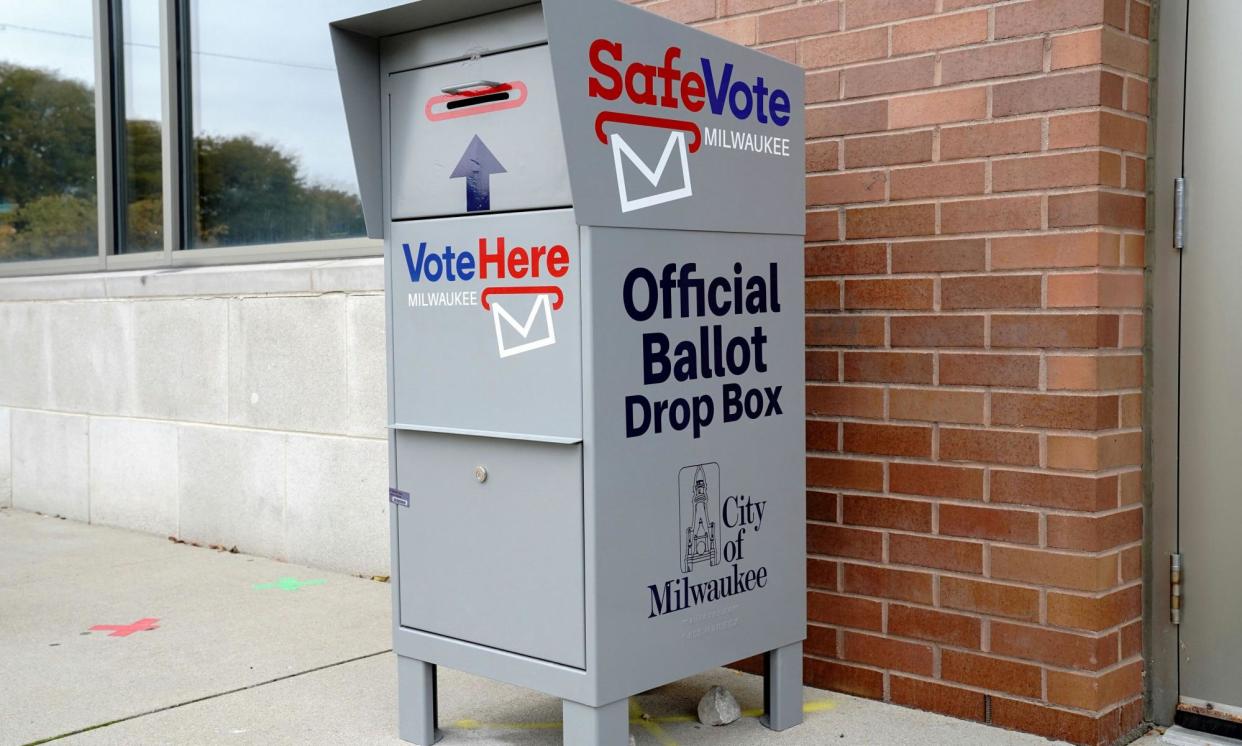Wisconsin supreme court appears poised to overturn ballot drop box ban

The Wisconsin supreme court appeared prepared on Monday to overturn a ruling banning the use of ballot “drop boxes”, the secured containers for absentee ballots that came under attack in the wake of the 2020 presidential election.
A ruling in the case could have significant consequences for election administration in the battleground state ahead of the 2024 election.
The use of drop boxes, which had been first implemented years before the 2020 election and Covid-19 pandemic, expanded rapidly as election officials searched for ways to keep voting accessible while reducing the spread of the virus. The drop boxes became a source of consternation after the election, though, especially among rightwing activists who doubted their security and falsely claimed the election had been rigged for Joe Biden.
The Wisconsin supreme court, then led by a narrow conservative majority, ruled in 2022 that ballot drop boxes were illegal because they were not specifically accounted for in Wisconsin law. Donald Trump himself weighed in, arguing the decision meant the state should retroactively overturn the 2020 election.
“Does Wisconsin RECLAIM the Electors, turn over the Election to the actual winner (by a lot!), or sit back and do nothing as our Country continues to go to HELL?” he wrote on social media.
The supreme court on Monday considered the case and whether to overturn the decision banning drop boxes ahead of the November elections – an outcome election officials advocated in a filing to the court in April.
“Drop boxes are convenient and efficient, both for voters and for clerks, because they allow voters to return their absentee ballots directly into a receptacle controlled by the municipal clerk without any concern as to whether the ballots will be timely received,” a group of election officials argued in a brief.
At the heart of oral arguments was the question of whether or not Wisconsin statute allows for the use of ballot drop boxes – and how much discretion election clerks have in administering their elections. In the 2022 Wisconsin supreme court case, Teigen v Wisconsin Elections Commission, the court found that because absentee ballot drop boxes are not specifically mentioned in state law, they couldn’t be legally implemented.
Liberal voter mobilization group Priorities USA, represented by the Democratic law firm Elias Law Group, brought a case challenging that conclusion in July, just weeks before control of the Wisconsin state supreme court flipped to a liberal majority.
The group argued on Monday that in finding absentee ballot drop boxes illegal on the grounds that they are not explicitly accounted for in state statute, the court had opened the door for a possible flood of challenges to elections in the state.
The liberal justices, who make up four of the court’s seven seats, appeared sympathetic to the argument that absentee drop boxes are permitted under Wisconsin law.
In a series of questions for David Fox, an attorney for Priorities USA, liberal-leaning justice Jill Karofsky cited the law guiding absentee voting, which stipulates that absentee voting must “be carefully regulated to prevent the potential for fraud or abuse” and asked if there was any evidence that drop boxes had facilitated fraud or abuse in 2020. Fox noted that there had been no evidence of fraud in connection with absentee drop boxes in 2020.
The conservative justices did not appear persuaded that they had ruled incorrectly in 2022. Justice Rebecca Bradley suggested that finding the drop boxes were legal would be tantamount to giving “free rein to municipal clerks to conduct elections however they see fit.”
As it stands, elections in Wisconsin are administered by 72 county clerks and more than 1,800 municipal clerks around the state. To ensure those offices comply with state elections law, the bipartisan board overseeing elections – the Wisconsin Elections Commission – issues guidance around proper election administration.
Ahead of the 2020 election, an attorney writing to the Madison election clerk on behalf of the Republican speaker of the assembly and the Republican senate majority leader said the legislators supported the use of absentee drop boxes, writing that they “wholeheartedly support voters’ use of any of these convenient, secure, and expressly authorized absentee-ballot-return methods”.
In a court filing and during oral arguments, the same attorney, Misha Tseytlin, made a very different argument on behalf of the state legislature. The drop boxes were illegal, he and other attorneys representing the Republican-controlled state legislature argued in a briefing, because state statute does not specifically authorize them. Overturning the case, Tseylin argued, would violate the precedent set by the court in 2022.
Fox argued that the interpretation of the law laid out in Teigen v Wisconsin Elections Commission was vague and could enable mass challenges to election practices that aren’t specifically outlined in state law.
“If everything needs to be expressly authorized, on pain of discarding ballots,” said Fox, “that is a loaded gun.”

